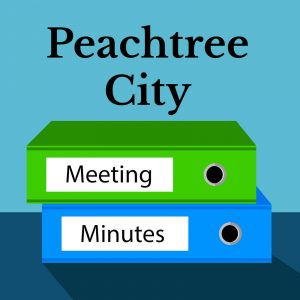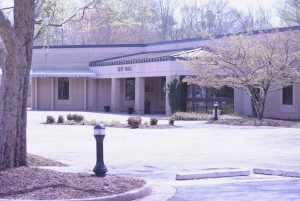Sewer service, unmoored from PTC Council control, may seek to find new customers outside city limits
Call it a line in the sand or call it a declaration of independence. Either way, the Peachtree City Water and Sewerage Authority (PCWASA) board of directors in an April 18 letter outlines the authority’s legal right, even duty, to function as an autonomous body, answerable to no other political body, including the Peachtree City Council. Neither is the board directly answerable to the voters, since they are volunteers appointed by the council.
In photo above, the 2017 Peachtree City Water and Sewerage Authority Board of Directors includes, from left, Chairman Bill Holland, Vice-Chairman Phil Mahler, alternate Bob Grove, new member John Oakey, member John Dufresne, and Secretary-Treasurer Frank Ward. Photo/Submitted.
Signed by Chairman Bill Holland, the letter came with input from the entire board. The letter maintains that PCWASA since its inception included service areas not always confined to Peachtree City, specifically stating that when formed by the Georgia General Assembly, its formation as an independent, autonomnous, public corporation defined that service area as “Peachtree City and its environs.”
“Those environs are what may require expansion in the future,” the letter said. That means WASA may seek to extend its sewer service outside the city limits of Peachtree City, opening up the prospect of significantly higher density developments on the city’s borders.
Peachtree City Manager Jon Rorie had no comment on the letter Tuesday afternoon.
Holland in the letter said that, while the current 6 million gallons per day (MGD) capacity is permitted, the legislation referenced a sewer utility that would be permitted to reach 30 MGD, if necessary. The letter states that such an expansion has not been demonstrated nor has PCWASA planned for such an expansion. PCWASA today is servicing approximately 3 MGD.
The line in the sand appears to be this: “The PCWASA Board of Directors believes that the citizens of Fayette County and Peachtree City would be better served if the Authority remained independent of the city or county.”
Asked about the line in the sand, Holland said the authority was created separate to avoid possible political problems, adding that PCWASA has tried to cooperate with the council and “I don’t think we should be part of the city.”
Whether previously having Tyrone as a potential customer or even Senoia, there could come a time when a customer agreement is in the offing. That is when the line is the sand will likely be acted on.
Responding to that question, Holland said there is a difference of opinion between the city attorney and the PCWASA attorney concerning what PCWASA can legally do. Speaking as an individual, Holland acknowledged “a potential for litigation if the council can’t come to an agreement that we are an autonomous authority.”
The letter also referenced the hope that “provincial attitudes will not continue to try to undermine PCWASA credibility and deter this Authority from its charter objectives and prudent actions to achieve optimally cost-efficient sewer system operations.”
Holland likened the term “provincial” to old-school thinking. Citing an example, Holland used the example of Tyrone’s proposal to buy additional sewer capacity.
He said some on the council believed that extending sewer to Tyrone would bring “all this growth.” Holland maintained that the high-pressure line “would not allow for that growth.”
Tyrone’s proposal for 350,000 gallons per day was withdrawn recently when the town opted for more capacity from Fulton County and was able to save on installation costs. An intergovernmental agreement between Peachtree City, Tyrone and PCWASA was worked on for approximately a year but was not forthcoming prior to Tyrone’s eventual agreement with Fulton County.
The letter noted that the current PCWASA board has members who have been in place only dating as far back as 2009, and all board members are volunteers, residents of Peachtree City, and appointed by the Peachtree City Council.
“This board does not have the ability to comment on what was happening at the Authority at the time of its founding. We only can make observations from matters of public record and inform Authority customers and citizens of the challenges PCWASA has faced and the progress we have made on their behalf,” the letter said.
The letter also provided the board’s perspective of PCWASA’s history.
“The sewerage system that PCWASA inherited — when the Authority was formed 30 years ago and began operating the system 10 years later in 1997 — was in critically poor physical condition. As a result, PCWASA was almost pushed to the brink of bankruptcy. Rate payers have borne the burden of correcting that neglect, but they likewise have received a great deal since from that investment,” the letter said. “Today, PCWASA is a financially sound, modernized and award-winning system in the middle phases of updating its infrastructure, as needed, to assure PCWASA customers receive safe, reliable sewer services.”











Leave a Comment
You must be logged in to post a comment.